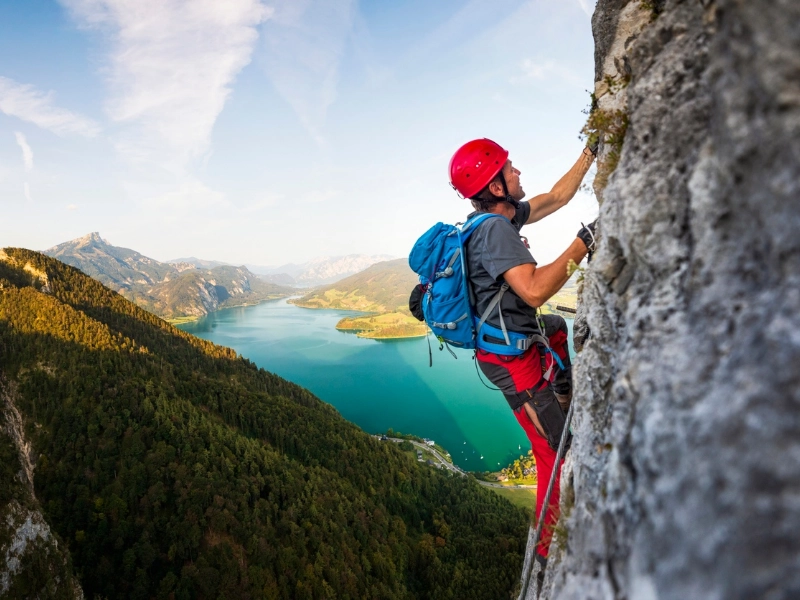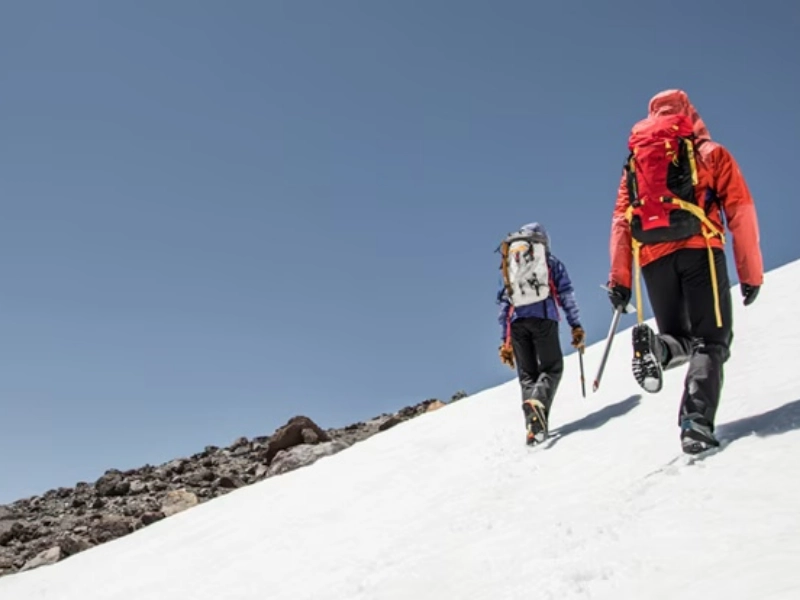When you first start out, it's crucial to gradually advance your abilities. A lot of mountaineers start their major adventures with teeth cut from local summits. Climbers frequently rely on porters to assist with gear and acclimatization during these prolonged journeys. However, there is still a chance of equipment failure even with these facilities.
 While many people who love the outdoors start out as hikers or backpackers, some climbers choose to advance and give mountain climbing a shot. The main goal of this more difficult and technical exercise is to reach the top of a mountain.
Mountain climbing demands a unique set of abilities that can be acquired through instruction and practice. It's a very fulfilling sport that makes lots of friends for life. There is no feeling of accomplishment comparable to climbing a hard mountain in other sports.
Mountaineers frequently have to endure extremely severe and challenging weather in order to reach a mountain's summit. These circumstances could include strong winds, bitterly cold temperatures, ice or snow, or even avalanches. It's crucial to check forecasts before heading out because these conditions may make the ascent more risky than usual. Most experienced mountaineers would disagree with this Freudian explanation of their pursuit of danger, despite some seasoned climbers being accused of doing unsafe things because they want to die.
While many people who love the outdoors start out as hikers or backpackers, some climbers choose to advance and give mountain climbing a shot. The main goal of this more difficult and technical exercise is to reach the top of a mountain.
Mountain climbing demands a unique set of abilities that can be acquired through instruction and practice. It's a very fulfilling sport that makes lots of friends for life. There is no feeling of accomplishment comparable to climbing a hard mountain in other sports.
Mountaineers frequently have to endure extremely severe and challenging weather in order to reach a mountain's summit. These circumstances could include strong winds, bitterly cold temperatures, ice or snow, or even avalanches. It's crucial to check forecasts before heading out because these conditions may make the ascent more risky than usual. Most experienced mountaineers would disagree with this Freudian explanation of their pursuit of danger, despite some seasoned climbers being accused of doing unsafe things because they want to die.
 Avalanches are the leading cause of climber fatalities and a significant risk to mountain climbing. Even the most skilled mountaineers are powerless to stop them from occurring since they can be highly unpredictable.
They frequently originate from the windward side of the mountain and form as snow slopes heat up in the spring and summer along with the sun. These avalanches are moist and can be very hard to predict.
In glaciers, they have the ability to shatter ice and rock, forming deadly crevasses. Climbers run the risk of dying or breaking bones if they fall into these as well. In mountain climbing, it's crucial to have the appropriate gear, know what you need and how to use it, and have self-awareness. Staying safe also requires understanding your boundaries and refraining from overexerting yourself. This calls for listening to other seasoned mountaineers as well as having a solid understanding of the terrain you intend to climb. This self-awareness aids in preventing conditions like cerebral or pulmonary edema, which is a buildup of blood in the brain or lungs. This is a potentially fatal illness that is quite dangerous.
Avalanches are the leading cause of climber fatalities and a significant risk to mountain climbing. Even the most skilled mountaineers are powerless to stop them from occurring since they can be highly unpredictable.
They frequently originate from the windward side of the mountain and form as snow slopes heat up in the spring and summer along with the sun. These avalanches are moist and can be very hard to predict.
In glaciers, they have the ability to shatter ice and rock, forming deadly crevasses. Climbers run the risk of dying or breaking bones if they fall into these as well. In mountain climbing, it's crucial to have the appropriate gear, know what you need and how to use it, and have self-awareness. Staying safe also requires understanding your boundaries and refraining from overexerting yourself. This calls for listening to other seasoned mountaineers as well as having a solid understanding of the terrain you intend to climb. This self-awareness aids in preventing conditions like cerebral or pulmonary edema, which is a buildup of blood in the brain or lungs. This is a potentially fatal illness that is quite dangerous.
 Hiking and trekking are not the same as mountaineering, which is regarded as riskier and more difficult. It frequently focuses on reaching the top of a mountain and calls for sophisticated climbing gear, including harnesses, ice axes, ropes, and crampons. To climb safely, climbers also need to possess sophisticated navigational abilities and prior mountaineering experience.
Mountaineers need to bring all the supplies they'll need for at least one overnight stay in the mountains in addition to this specialized equipment. Along with food and water, this also includes a 4-season tent, sleeping bag, and other camping essentials. Additionally, navigational aids like a headlamp and a handheld GPS device are crucial. Selecting the appropriate power outlet is crucial for recharging these gadgets. Because of its lightweight and portable design, we suggest the Jackery Explorer 500 Portable Power Station.
Although reaching the summit requires a great deal of preparation, it is an incredible experience. If mountaineering is something you're interested in, begin your training with a bulky backpack to get yourself ready for lengthy days in the mountains and familiarize yourself with navigation and climbing equipment.
Hiking and trekking are not the same as mountaineering, which is regarded as riskier and more difficult. It frequently focuses on reaching the top of a mountain and calls for sophisticated climbing gear, including harnesses, ice axes, ropes, and crampons. To climb safely, climbers also need to possess sophisticated navigational abilities and prior mountaineering experience.
Mountaineers need to bring all the supplies they'll need for at least one overnight stay in the mountains in addition to this specialized equipment. Along with food and water, this also includes a 4-season tent, sleeping bag, and other camping essentials. Additionally, navigational aids like a headlamp and a handheld GPS device are crucial. Selecting the appropriate power outlet is crucial for recharging these gadgets. Because of its lightweight and portable design, we suggest the Jackery Explorer 500 Portable Power Station.
Although reaching the summit requires a great deal of preparation, it is an incredible experience. If mountaineering is something you're interested in, begin your training with a bulky backpack to get yourself ready for lengthy days in the mountains and familiarize yourself with navigation and climbing equipment.
 The excitement of pushing your strength, talent, intelligence, courage, and resolve to the maximum in dangerous situations is embodied in mountain climbing. Numerous abilities are required for this sport, such as hiking, rock and ice climbing techniques, and awareness of mountain survival.
To climb a peak or even finish a mountain traverse, mountaineers need to be skilled in these areas. It's also critical to comprehend the quickly changing weather patterns in mountains and to know how to read maps and use a compass.
The physical rigors of climbing require climbers to know how to manage and take care of the equipment they bring with them. Furthermore, alpinists frequently travel quickly and lightly, cutting down on the amount of time they spend on hazardous mountains and lowering their exposure to risks like avalanches. They may now climb mountains with greater safety than those who came before them.
The excitement of pushing your strength, talent, intelligence, courage, and resolve to the maximum in dangerous situations is embodied in mountain climbing. Numerous abilities are required for this sport, such as hiking, rock and ice climbing techniques, and awareness of mountain survival.
To climb a peak or even finish a mountain traverse, mountaineers need to be skilled in these areas. It's also critical to comprehend the quickly changing weather patterns in mountains and to know how to read maps and use a compass.
The physical rigors of climbing require climbers to know how to manage and take care of the equipment they bring with them. Furthermore, alpinists frequently travel quickly and lightly, cutting down on the amount of time they spend on hazardous mountains and lowering their exposure to risks like avalanches. They may now climb mountains with greater safety than those who came before them.